Beef protein vs whey protein (Which is better for muscle growth?)

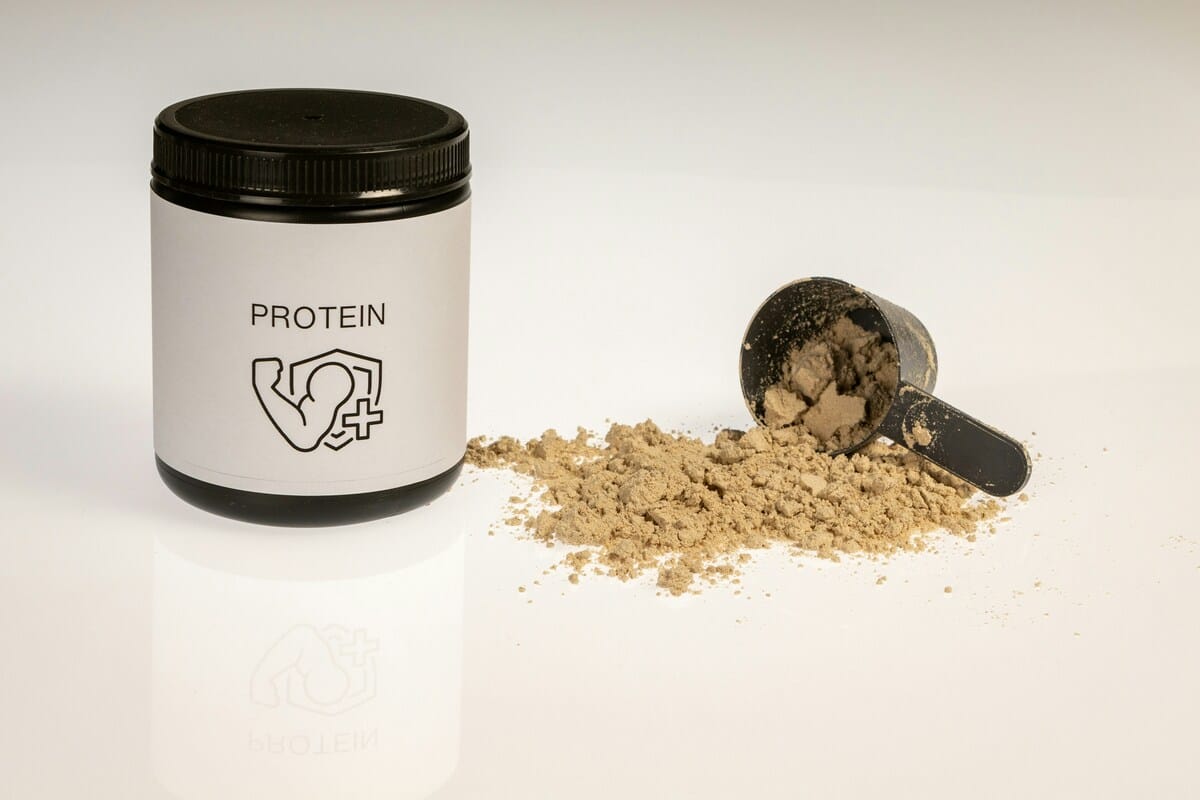
What is beef protein isolate? 🥩
There are two types of beef protein powder you’ll probably come across:
- Hydrolysed beef collagen 🦠
- Beef protein isolate 🍖
The second one, beef protein isolate, is most similar to whey protein.
That’s because collagen protein is useless for muscle growth.
There’s some evidence that it may help with the regeneration of cartilage and other connective tissue. But it won’t help you grow new and larger muscle fibres.
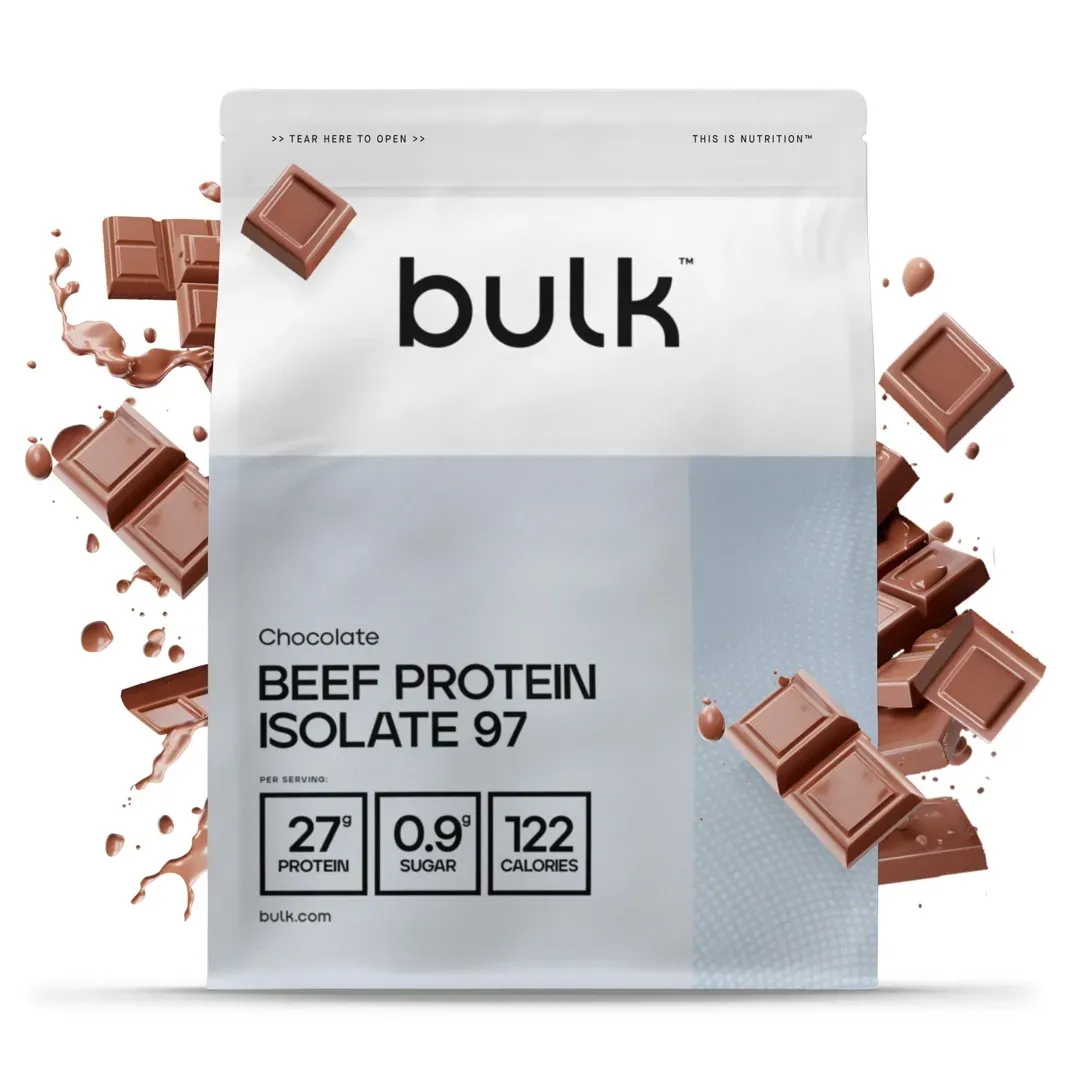
Beef protein isolate, then, is the one we’re interested in.
What is beef protein made from?
I once contacted Bulk Powders, a sports nutrition supplier here in the UK, to ask them what their beef protein was made of.
Their response said Bulk Powders’ beef protein is made from “lean muscle tissue from grass fed bovine”.
If this is true, then this product really is made from the same stuff you’d use to make meat balls or spaghetti bolognese.
But should we trust this?
It took a fair bit of back and forth for the team to come back to me with a concrete answer. Even then, we have to take them at their word that this is pure bovine muscle tissue, and that there’s no collagen present.
If there is collagen present, then the amount of protein per serving the body can use for muscle growth reduces in proportion to the amount of collagen present.
What’s more, some beef protein powders will contain at least some collagen.
This is what the product description for Applied Nutrition’s BEEF-XP product says:
“In essence, beef protein refers to any protein sourced from beef. In the context of supplements, however, it usually refers to an alternative protein powder derived from bovine sources, including collagen.“
And from further down the page:
“Beef protein is derived from cow meat or collagen…”
With this description sitting right next to their own product, we have to assume there’s some collagen in there.
How does beef protein powder compare to regular beef?
So, how does beef protein powder compare to regular beef? Specifically for muscle building purposes?
There are going to be some benefits to powdered beef protein:
- First, in a dehydrated, powdered form, beef protein isolate will more or less keep forever in the cupboard.
- The powder will also take way less time to prepare. You can just mix it with milk or water and drink.
- Lastly, beef protein powder is flavoured and sweetened. You can swap different flavours in and out for variety. And if you have a sweet tooth, this should help curb any cravings.

Nutritionally-speaking, there are few differences.
One of the largest, though, is that beef protein isolate, being very concentrated, is much higher in sodium than raw beef. Some brands more than others. 🧂
Applied Nutrition’s BEEF-XP Clear Hydrolysed Beef Protein has a 3.4g of salt per 100g.
Bulk Protein’s Beef Protein Isolate Powder has less than half that, at 1.54g of salt per 100g.
Beef protein nutritional info
Let’s compare the nutritional information for two different brands of beef protein isolate.
First, Applied Nutrition’s BEEF-XP:
Next, Bulk Powders’ Beef Protein Isolate 97:
Both are around 400 calories per 100g. The Bulk Powders product has slightly more fat and carbohydrate, but less than half the salt content of the Applied Nutrition product.
What should stand out immediately is how high the protein concentration is in each of these. Both are at least 90% protein by weight. Compare this to most whey protein powders, where you’re getting 70-80% protein by weight.
But this isn’t the full story. 🤫
We want to know how well the body can use the protein it’s getting for muscle protein synthesis.
We already know there’s no enforced standard as to how much collagen protein might be in a serving of beef protein isolate powder. So we don’t know if this high protein content is artificially inflated with the inclusion of collagen proteins.
To further examine the muscle-building potential of the protein we’ll get from beef protein powder, we need to examine the amino acid profile, as well as the bioavailability of the source.
What is whey protein? 🥛
Whey protein powder is made from whey, which is a by-product of the manufacturing process for cheese. 🧀
When milk is curdled, it separates into curds and whey.
Whey powder is formed from liquid whey when it’s dehydrated, or hydrolysed.
The final product has various other ingredients added to it to:
- Stabilize it
- Preserve it
- Flavour it
- Make it mix and rehydrate well
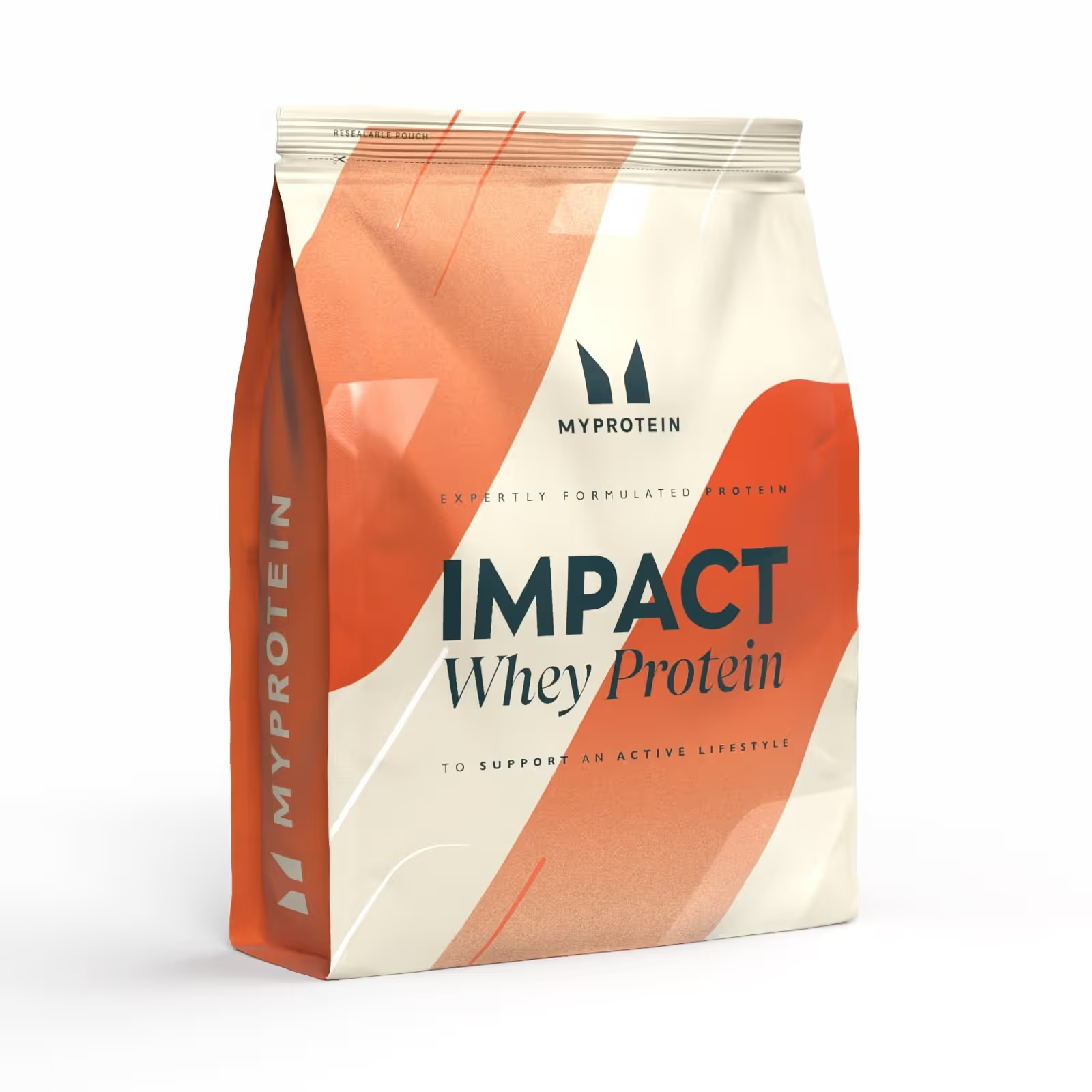
Whey protein nutritional information
Naturally, whey protein powder is high in protein – but it’s not 100% protein by weight.
This is because manufacturers add other ingredients, like flavours and stabilizers.
Here’s the nutritional information for a typical whey protein concentrate product:
Notice how it's only about 72% protein by weight, while beef protein is 90% protein by weight.
Though, as we're about to discover, protein quantity doesn't account for much when the protein quality is called into question. 👇

Pros and cons of beef and whey protein
First, let’s examine the pros and cons of each, before pitting them head to head.
Pros and cons of beef protein
Pros:
- Beef protein powder is cheap
- Good dairy-free option for those who need to avoid lactose
- Slow digesting (may keep you feeling fuller for longer)
Cons:
- It doesn't taste great
- It has an odd odour
- It doesn’t mix well
- Questionable protein quality / amino acid breakdown
Pros and cons of whey protein
Pros:
- Tastes good
- Mixes well
- Fast digesting (absorbs quickly post-workout)
Cons:
- Unsuitable if you’re vegan
- If you’re lactose intolerant, you’ll need whey protein isolate, which tends to cost more than whey concentrate
Beef protein vs whey protein (Is beef protein isolate as good as whey protein?)
1) Protein quality
As we’ve discussed above, there’s no external, enforced standard for how much beef collagen is allowed in beef protein isolate products.
And while collagen may have some benefits, none of them relate to muscle growth. 🙅♂️
For that reason, it’s impossible to know how much usable protein your body will get from a serving of any beef protein.
If we assumed, though, for a second that all 90+ grams of protein per 100g of beef protein powder were usable by the body (which is an ideal, and unrealistic, scenario), let’s put it head to head against whey protein powder and see which one comes out on top.
(i) Protein bioavailability
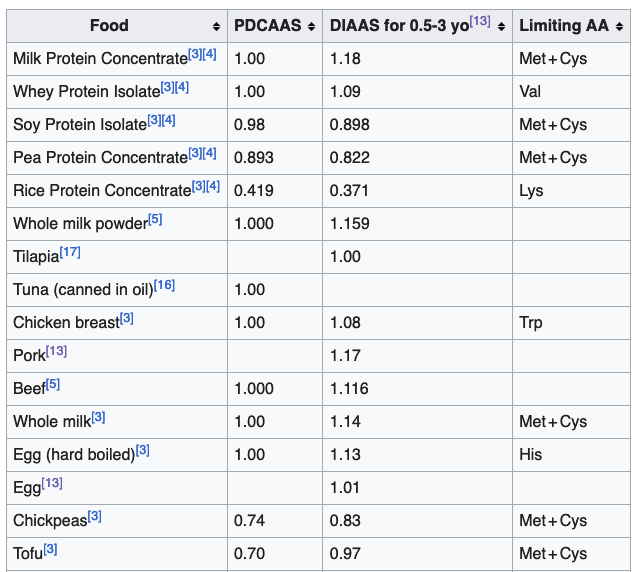
From the above chart, we can see that the PDCAAS and DIAAS scores (two different methods of measuring protein bioavailability) of whey protein isolate and beef are pretty similar. The DIAAS score (the newer, more trusted index) is actually slightly higher for beef.
When it comes to muscle growth, the biggest lever is total daily intake. If we want to be pedantic, though, we’re most interested in the leucine content of any given protein source.
(ii) Leucine content
From the above graph, courtesy of Research Gate, we can see that whey sets the standard for leucine content, with Maize being surprisingly high, and beef coming in decently well, but falling far short of whey’s leucine content.
While beef's overall bioavailability, then, is comparable (or even marginally higher) to whey's, whey has the clear edge in leucine content.
This, combined, with the uncertainty around beef protein’s collagen contents, allows us to safely say that whey protein isolate edges out beef protein in the quality argument.
Winner: Whey
2) Taste
When it comes to taste, whey protein is the clear winner.
It has simply been around longer, and is the most popular sports supplement in the world.
With so much competition, companies have had a vested interested in producing the tastiest, most palatable whey protein powders for a long time.
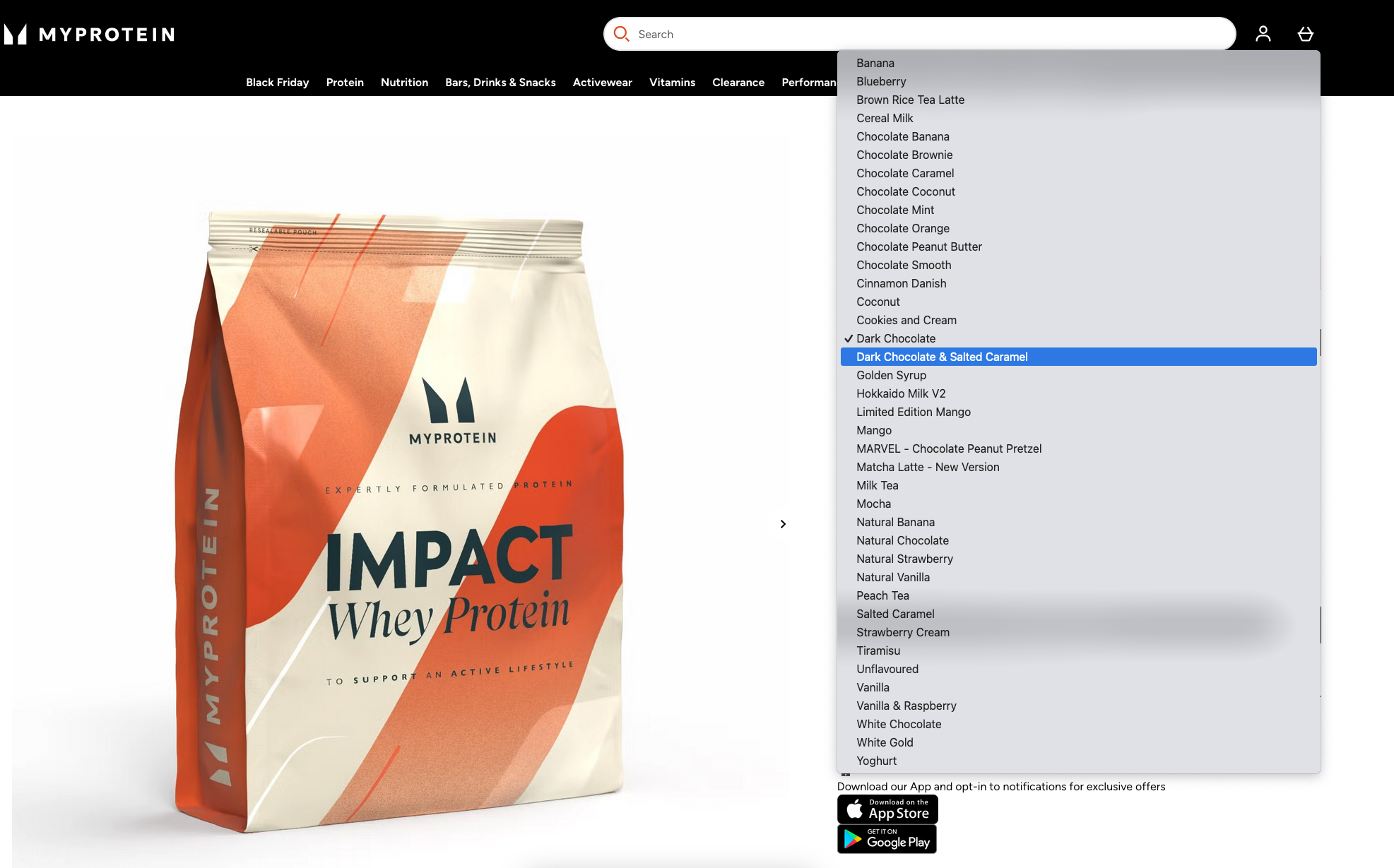
That means you get very consistent, nice tasting, well-mixing whey protein powders these days. In more flavours than you might have thought possible.
Beef protein, on the other hand, has a strange odour, which affects the overall experience. And it tastes slightly odd.
As for texture, beef protein is somehow both chalky and sticky at the same time, and has a tendency to clump unless you use a high-speed blender to mix it. It doesn’t mix well with oats or yoghurt.
Overall, its use is limited and the experience isn’t great.
Winner: Whey
3) Price
When it comes to price, you could argue that beef protein powder comes out on top.
Beef protein is cheap year-round. In part, that’s because it’s in lower demand than other types of protein powder.
Consider, though, that beef protein’s low demand is down to:
- The visceral reaction many people have when they think about drinking powdered beef.
- Its poor taste and bad odour don’t help, here.
Be aware, too, that the protein you’ll find in beef protein powders may be of lower quality than that in whey protein powders. Due both to lower leucine content, and due to the presence of higher quantities of collagen.
Paying less for an inferior product isn't a good deal. 🤷♂️
Also, beef protein doesn’t get discounted as often, since consumers aren’t paying that much attention to it. During a sale, once whey and beef protein are on an even footing price-wise, it’s much harder to see the appeal.
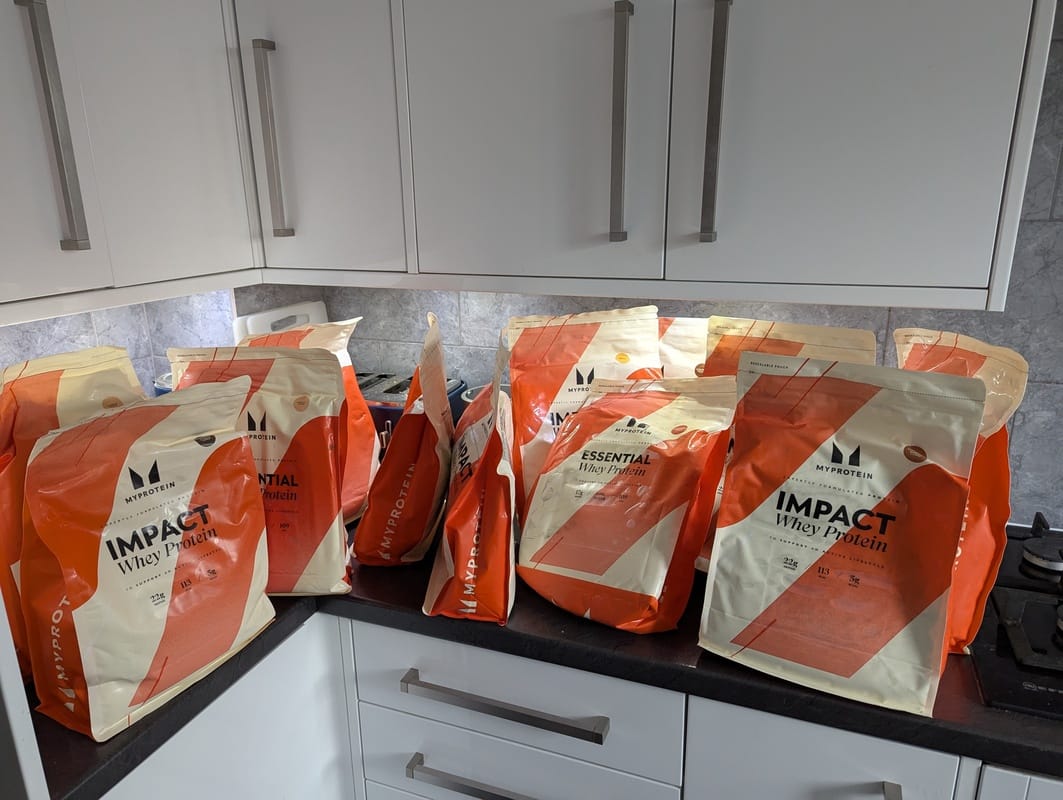
Still, since beef protein does tend to be cheaper most of the time, we can't call it an outright loser in this category.
Winner: Tie
4) Tolerance
As for tolerance, whey protein is a dairy by-product. For this reason alone, more people should be able to tolerate beef protein powder than whey.
Those with milk allergies should avoid whey protein powder completely. Vegans won’t be able to consume whey, but they wouldn’t touch beef protein either.
For lactose intolerant people, it’s less straightforward. Whey protein isolate is purer, and contains very small amounts of lactose. All but the most lactose intolerant individuals should be able to add whey protein isolate into their diet without experiencing discomfort.
The same goes for those looking to avoid lactose because it’s high FODMAP. Opting for whey isolate removes much of the lactose, meaning you should be able to consume it, so long as you don’t go nuts with the portion sizes.
Still, beef protein powders don't need these kinds of considerations, and are generally well tolerated. For that reason, beef wins here.
Winner: Beef
Conclusion
Our conclusion? Whey protein powder is better than beef protein.
Beef protein powder simply doesn’t make for a great eating experience. Sure, that’s subjective, but we think few would disagree. And if you're using protein powder to help you reach a daily protein goal, you need to enjoy the experience.
Considering it’s cheaper, and contains more protein by-weight than whey, beef protein could make for a decent budget option. Especially for those less swayed by taste.
But the issue here is there’s no standard for how much collagen might be in beef protein powders. This calls the protein quality into question.
Price-wise, if you buy your whey protein powder in a sale, the savings are negligible, too.
This makes whey protein the clear winner for the majority of people looking to build muscle and strength, or support their weight loss goals.



